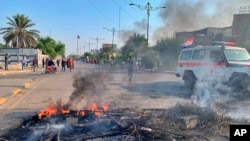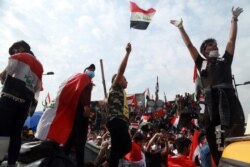At least five people were killed when Iraqi security forces used live ammunition against protesters in Baghdad, police and hospital officials said Monday.
Security forces fired at demonstrators who came within 500 meters of the prime minister's office Monday. Security forces had previously used tear gas and rubber bullets to deter protesters trying to breach barricades near the office.
At least 250 people have been killed since anti-government protests began on October first.
Overnight, security forces shot dead at least four protesters in Iraq's holy city of Karbala overnight after a group tried to scale the walls of the Iranian consulate, Iraqi officials said Monday.
Protesters gathered at the site late Sunday and chanted, "Iran out, Karbala remains free."
Before the shootings, officials said protesters also threw objects over the walls and tried to set fires at the consulate site.
Tens of thousands of anti-government demonstrators have gathered in recent days in Baghdad's Tahrir Square and across southern Iraq, shutting down markets, factories, schools and universities in protest of the political system in place since the 2003 U.S.-led invasion that toppled dictator Saddam Hussein.
Prime Minister Adel Abdul-Mahdi called for the shuttered places to be reopened, contending that the threat to oil facilities and closure of roads had cost Iraq "millions" of dollars and contributed to consumer price increases in the country.
"It's time for life to return to normal," the Iraqi leader said.
Thousands of students have skipped classes to join the protests, blaming the country's leaders for rampant corruption, high unemployment and poor public services. Syndicates of engineers, doctors and lawyers have all backed the protests.
The protesters on Sunday blocked roads around the main protest site in Baghdad with burning tires and barbed wire. At one roadblock, the demonstrators unfurled a banner saying, "Roads closed by order of the people."
Since early October, security forces have fired military-grade tear gas, rubber bullets and live ammunition at the protesters.
The government has proposed a string of reforms, including more jobs and social welfare plans, along with early elections once a new voting law is adopted.
But the protesters have continued to challenge the government.
The protests are leaderless, without an organizational structure, and they are not unified. However, they have drawn a wide swath of the population from across the country’s sectarian and ethnic divides.
A move in Iraq’s parliament to approve a bill to cancel privileges and bonuses for senior politicians, including the president, prime minister and Cabinet ministers, has done little to calm the marchers.






